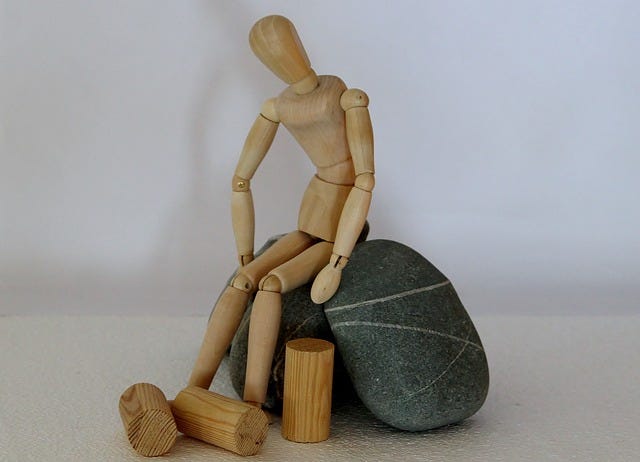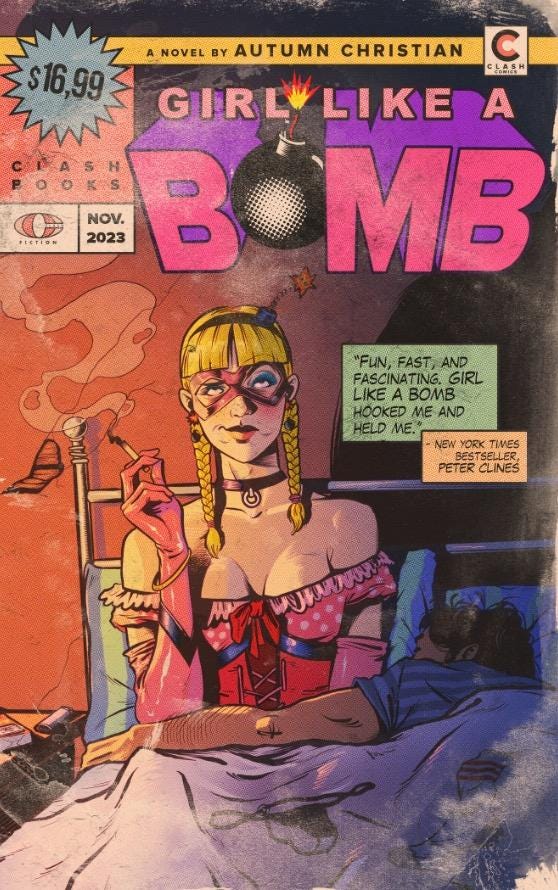A Burning Circle of Light
The loneliness of responsibility
“Most people do not really want freedom, because freedom involves responsibility, and most people are frightened of responsibility.” - Sigmund Freud.
My darkest hours are between three and five in the afternoon.
It’s the time after I’ve done most of my daily chores. I’ve worked out and taken a walk, made our meals, fed my daughter, and gotten her up from her nap. Maybe we’ve gone out to the park, store, aquarium, or mall and headed back home. And sometimes I visit my grandma and aunt on the farm. But on the days that I don't, between the hours of three and five, it’s often just my daughter and me. I feel this crescendo of loneliness without anything else to occupy my mind. It’s bright and piercing and uncomfortable. I panic and try to do whatever I can to push the feeling down.
These are darkened cave hours. These are suicide hours. There are still swathes of time to kill before the moon explodes over the horizon and the sun swings low and disappears, but I feel the night-soaked glow of craziness.
There is no doubt that I need more female friends who are also stay-at-home mothers. If you’re reading this and happen to live in Kingfisher, Oklahoma (Pop. 5000), then shoot me an email. But what I felt between hours between three and five wasn't the loneliness I’m used to. I’d become a friend of loneliness and welcomed it even when its pang hurt my heart. I’d been a stay-at-home girlfriend long before it was an obnoxious TikTok fad. I spent years in the solitude of my skull while my husband was at work, and before that, I spent more time writing at my computer than going out with friends. I felt at peace alone, like I could wholly be myself.
So what was this feeling? And why had I labeled it ‘loneliness’?
Mothers always talked about how being a stay-at-home mom was lonely. I assumed it was because they were no longer in the office or at work, surrounded by customers and coworkers, and the bustle that kept them distracted from self-destructive thoughts. But “stay-at-home mom” doesn't mean we have actually to be in the house, and most of the stay-at-home mothers I knew had a packed schedule of play dates, outings, zoo trips, and lunches.
Still, I could see on their faces what I felt. They were lonely, too.
We all felt relief when we ran into another mother who understood that loneliness. It's like the camaraderie I'd imagine from people who had been at war. Many of us have nothing in common. We probably wouldn't be friends in any other circumstance, but we're all bound by a permanent, life-changing experience that supersedes all other aspects of our personality.
Can you blame me if I spent $40 on a red Valentine's Day edition Stanley Cup from eBay? I've tried to resist mindless fads in the past, but maybe I’ve been going about it all wrong. Mothers need some tribal signifiers, to be able to identify each other across a crowded room, to advertise our willingness to conform and compromise in the name of a common good. So this year, one of those tribal signifiers is an expensive water holder. So be it. At least it's pretty.
Once you become a mother, you cross an irrevocable and permanent divide into another phase of adulthood.
A part of you disappears, burned away in the transition, to be replaced by an avatar.
You’re not just an individual anymore. You become an archetype. You are not just the mother of your child, you are all mothers. You are not just raising a single person into adulthood; you become the representative of all of society’s rights and wrongdoings.
To become a mother is to join hands with an unbroken chain of DNA that extends from here to eternity.
That's why ‘mother’ as a category is the target of so much wanton anger and abuse. We can no longer pretend that we're a hyper-individualized, atomized society when we see a mother at the coffee shop on her phone, who only looks up to scream at her children for swinging their legs or spinning in their chairs. Those children don't just belong to their mother. They belong to everyone. They will go out into the world carrying the mother's sins on their shoulders. All the serial killers, mass shooters, and wife beaters of the world had mothers. And so did all of the saints.
It's your responsibility to raise a good person, and even though others will judge and shame you, they can’t take any of that responsibility away from you. Not even if they wanted to. People talk about having a “village,” but all of the responsibility is on you if anything goes wrong with your child. Friends will hold your baby until she cries or fusses, and then she goes straight back to you. Dad can bring food while you're breastfeeding, but he can't do the work for you. For the first ten months of my child's life, she wanted nobody else but me.
Even when I was in the hospital giving birth, holding my husband's hand while a nurse directed me to push, I felt that loneliness. No matter how much support I had, it was ultimately up to me to bring the child into the world. I stayed in the hospital for three days afterward, and an endless array of nurses and technicians came through my hospital room, and my family flew into town to visit, but I lay with my daughter, the two of us alone, and knew that nobody would ever be able to take care of her for me. We existed inside of a burning circle of light. Everyone else existed outside the perimeter of it and could not penetrate it.
It was the first time in my life I was truly responsible for something.
I could quit my job without notice and barely cause a ripple. Within weeks I wouldn't even be missed. I could leave my husband, but he could always find someone else. I could quit writing, but who would really care? There are millions of eager writers who’d fill the space I left behind. So, sure, why not, I’ll drink and stay up late and siphon off time with useless distractions. The world continues on above my drunken head, unrelenting in its movement, despite my childish acts of self-destruction.
But a child? Your child? They cannot be forgotten, abandoned, or failed without irrevocably changing the world. If you fail your responsibility to your child, they can die. Other people can die.
It's lonely the first time you realize you're the only one who can bear a responsibility.
It crushes some people into bitter and ugly versions of themselves. They become hateful because they resent the idea of having to carry any burden at all. You can see it in their body and their faces when they're sitting in their car at a stoplight or checking out at Walmart. They've been deformed by an invisible but very real weight.
And for other people, that responsibility transforms them. They learn to pick up the weight and become stronger. They are like gymnasts who smile even when falling upside down, their necks inches away from snapping against the floor.
Lately, I've been trying to embrace that feeling of loneliness instead of trying to run away from it. It shifts inside me, peeling away my expectations, larger than the body that contains it. It's uncomfortable and new and nobody ever prepared me for it. I spent a lifetime running away from responsibility, not embracing it.
I want to feel that loneliness. It's a reminder that I carry a weight that can either make me stronger or crush me underneath it.
It's all in the way you carry it.
The second edition of Girl Like A Bomb (With a new Epilogue) is now available! Grab it either on Amazon or on the CLASH website.




I know this feeling, sort of, as I experienced that pang of loneliness after staying at home all day with my children when they were babies. I often wished I could relate to the other mothers at story time as easily as they did among themselves, signaling that they all belonged to the same tribe. Yet it’s also weirdly fortifying, seeing what one person can endure, and coming out on the other side of it